Are you tired of feeling like just another number to brands? Do you crave experiences that truly understand your needs and preferences?
You’re not alone! In today’s digital landscape, customers are demanding more, and businesses are responding by embracing the power of personalization. This isn’t just a fleeting trend; it’s a fundamental shift in how successful companies connect with you, the customer.
Imagine this: a brand knows exactly what you love, offering you deals on your favorite products before you even search for them. Their website feels intuitive, guiding you effortlessly to exactly what you need.
Your inbox is filled with exciting, relevant content, not generic spam. This isn’t a futuristic fantasy; it’s the reality of a personalized experience, and it’s rapidly becoming the norm in 2025.
The Rise of You: Why Personalization Matters More Than Ever
In a world overflowing with information and endless choices, businesses are fighting for your attention. They recognize that a one-size-fits-all approach no longer works.
We, as consumers, are frustrated by impersonal interactions (71% of us, to be exact!). We crave recognition, a sense that brands see us as individuals, not just another transaction.
In fact, a significant 76% of us prefer to buy from brands that personalize our user experiences. This isn’t just about feeling good; it’s about making our lives easier and more efficient.
59% of online shoppers, for instance, believe personalized stores make it easier to find products that genuinely interest them.
The Business Advantage: Personalization Drives Growth and Profit
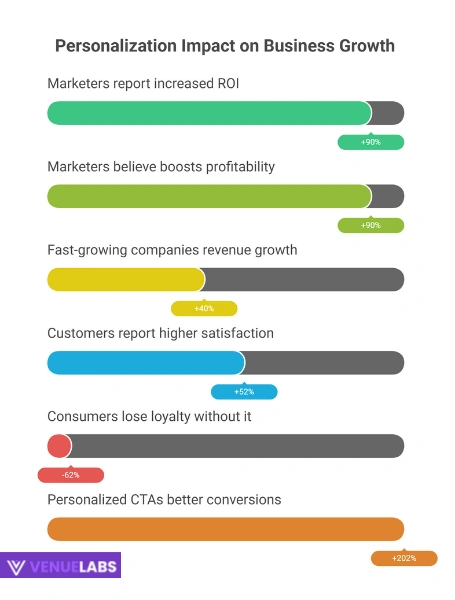
Personalization isn’t just a feel-good strategy; it’s a powerful engine for business growth. Marketers are seeing incredible returns on their personalization investments.
A staggering 9 out of 10 marketers report increased ROI, and 90% believe it directly boosts profitability. Companies that excel at customer intimacy experience faster revenue growth, with fast-growing companies generating 40% more revenue from personalization than their slower-growing rivals.
The potential is immense, with some reports suggesting that personalization can potentially boost a company’s ROI by a massive 2000%! Even without advanced tools, businesses can see an average increase of 500% to 800% after implementing personalization.
Here’s a quick look at why businesses are embracing personalization:
| Benefit of Personalization | Impact |
| Increased ROI | 9 out of 10 marketers see this |
| Boosted Profitability | 90% of marketers agree |
| Enhanced Revenue Growth | Fast-growing companies see 40% more |
| Improved Customer Satisfaction | 52% of customers report higher satisfaction |
| Stronger Brand Loyalty | 62% of consumers lose loyalty without it |
| Higher Conversion Rates | Personalized CTAs lead to 202% better conversions |
Source: Statista.
2025: The Year of AI-Powered Personalization
Get ready for a revolution! Artificial intelligence (AI) is taking personalization to an entirely new level. By 2025, an astonishing 95% of customer interactions are expected to be powered by AI.
This means faster, more effective, and truly tailored experiences across all platforms. AI will automate and enhance everything from chatbots providing instant support to sophisticated recommendation engines that understand your deepest desires.
Businesses are already recognizing this power, with 92% of them leveraging AI-driven personalization tactics to drive growth.
Your Data, Your Experience: The Personalization Exchange
You might be thinking, “How do brands know so much about me?” The answer lies in data. While 62% of consumers report feeling they have lost control over their private information, there’s a clear willingness to share data for a better experience.
A large portion, 82%, of consumers are willing to share their data for a more customized experience.
In fact, 90% of customers are ready to share data to receive exclusive discounts on products they are interested in. The key is trust and transparency. You appreciate personalization as long as it’s based on data you have explicitly shared (69%).
Where Personalization Is Happening: Across All Touchpoints
Personalization isn’t limited to one area; it’s weaving its way into every interaction you have with a brand.
The State of Personalization in 2025: Key Insights
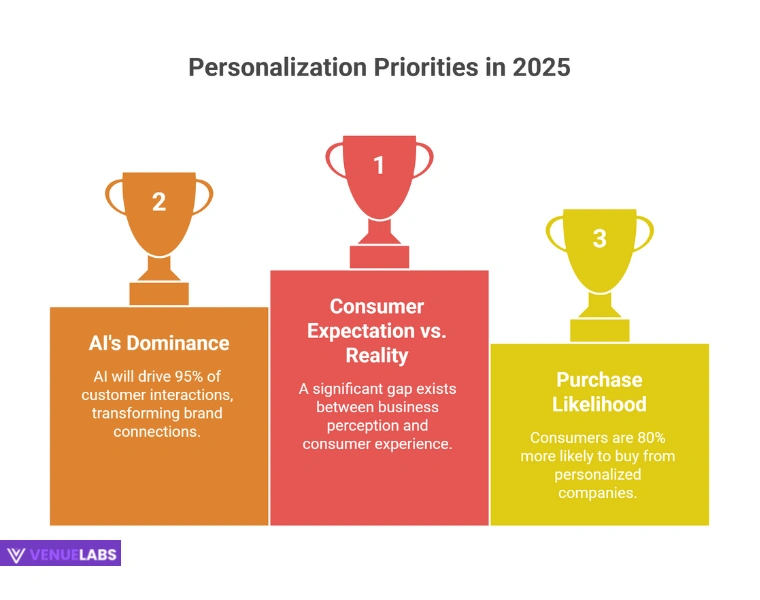
| Statistic Highlight | Details |
| Consumer Expectation vs. Reality | While 85% of businesses believe they offer personalized experiences, only 60% of consumers agree. This gap highlights a crucial area for improvement. |
| Product Discovery | 59% of online shoppers say personalized stores make it easier to find products that interest them. |
| First-Party Data | A significant 37% of brands rely exclusively on first-party data (information collected directly from you) to personalize experiences, showing a move away from third-party cookies. |
| Purchase Likelihood | Consumers are 80% more likely to purchase from companies offering tailored experiences. |
| Retailer Struggle | A staggering 96% of retailers struggle with executing effective personalization, indicating a complex challenge despite its clear benefits. |
| AI’s Dominance | In 2025, 95% of customer interactions will be driven by AI, transforming how brands connect with you. |
| Recommendation Engine Market | This market is forecasted to reach $12 billion by 2025, a massive leap from $1 billion in 2018, underscoring the demand for intelligent suggestions. |
| Brand Loyalty | 62% of consumers reported losing loyalty to a brand if they didn’t provide a personalized experience. |
| Content Personalization | Only 32% of businesses say that most of their content is personalized, leaving ample room for improvement. |
| Consumer Prioritization | 72% of consumers reported that personalization is the top priority when dealing with brands and their products. |
Business Personalization: Fueling the Growth Engine
Businesses are pouring resources into personalization because they see the tangible results.
- Revenue Boost: Companies that provide a personalized experience can generate 40% more revenue. According to a McKinsey report, US companies could easily generate $1 trillion if they put more effort into personalization.
- Success Factor: 75% of business leaders believe personalization is a critical reason for success, influencing brand image and customer satisfaction.
- Hybrid Experiences: 43% of executives believe personalization is the top reason to invest in hybrid experiences (combining online and offline).
- Investment Surge: Around 90% of online businesses actively invest in personalization. This is especially true for small businesses leveraging customization as a unique selling proposition (USP).
- eCommerce Focus: 74% of eCommerce businesses personalize their websites, but also invest in email and ad personalization.
B2B Personalization: Building Stronger Business Relationships
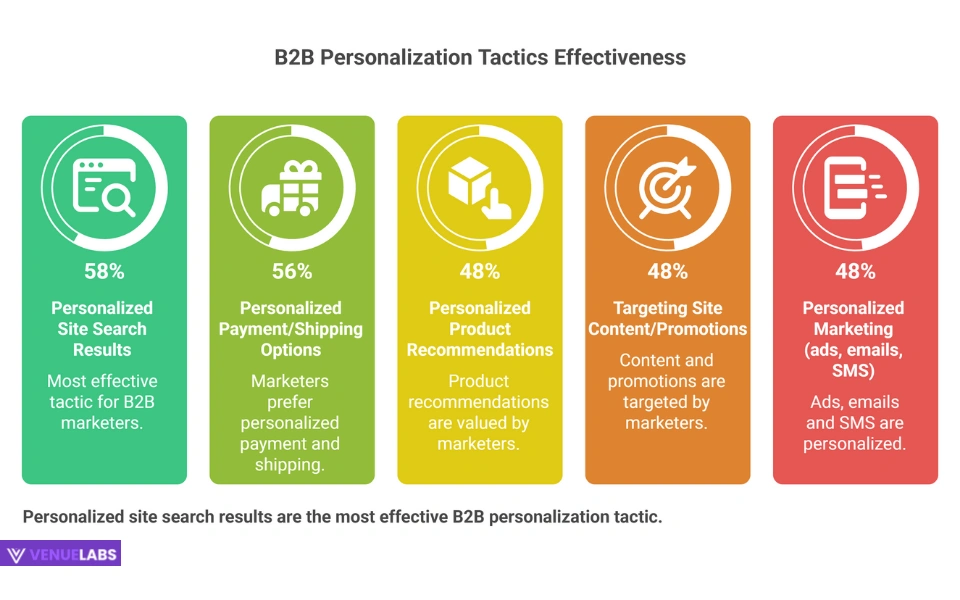
It’s not just about individual consumers; businesses are personalizing their interactions with other businesses too.
| B2B Personalization Data Collection & Usage | Percentage |
| Collect behavioral and transactional data | 72% |
| Use collected data for personalization | 68% |
| Unify data from multiple systems to boost personalization | 67% |
| Analyze and gain actionable data from collected insights | 61% |
| Leveraged backend systems for deeper personalization | 58% |
| Use data collected to drive personalization on other systems | 57% |
The most effective B2B personalization tactics include:
- Personalized Site Search Results: 58% of B2B marketers find this highly effective.
- Personalized Payment/Shipping Options: Preferred by 56% of marketers.
- Personalized Product Recommendations: Valued by 48%.
- Targeting Site Content/Promotions: Also 48%.
- Personalized Marketing (ads, emails, SMS): Another 48%.
Despite the benefits, 40% of B2B companies find personalization a huge challenge, highlighting the complexity of implementing these strategies effectively.
Personalized Marketing: Cutting Through the Noise
Imagine an ad that genuinely speaks to your needs, or an email that feels like it was written just for you. This is the power of personalized marketing.
- Profitability Driver: 90% of leading marketers believe personalization is a crucial contributor to business profitability.
- Retail Investment: 79% of retail businesses invest in personalization tools.
- Customer Experience Focus: 88% of marketers aim to improve customer experience through personalization.
- Content King: 62% of marketers believe content is the most used format for personalized experiences, with 60% claiming their digital content is extensively personalized.
- Top Uses: Product recommendations and predictive customer service are the top two uses of personalization in marketing.
Personalization ROI: The Proof is in the Profits
The numbers don’t lie: personalization pays off.
- Brand Growth: 88% of US marketers saw personalization efforts lead to brand growth.
- Massive ROI Potential: Personalization can boost a company’s ROI by up to 2000%. Companies with advanced personalization witnessed returns of $20 per $1 spent.
- Revenue Goal Achievement: 79% of businesses that outperformed revenue goals invested in personalization. On average, this increases revenue by 5% to 15%.
- Positive Campaign ROI: 88% of marketers observe a positive ROI on personalization in their campaigns.
Consumer Personalization: Meeting Your Expectations
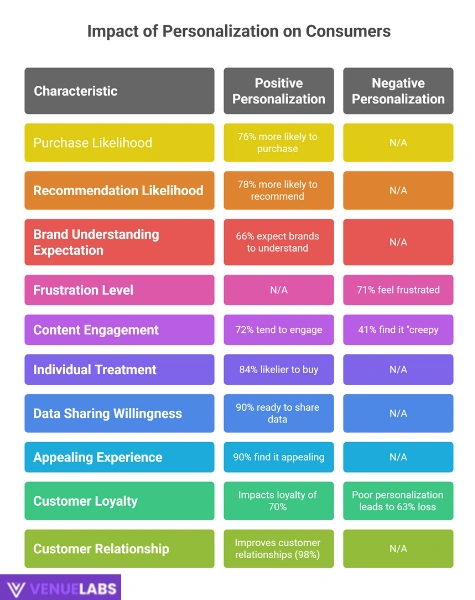
You expect personalization, and brands are scrambling to deliver.
- Purchase Likelihood: 76% of consumers are more likely to purchase from personalized brands. 78% are more likely to recommend such brands and make repeat purchases.
- Expectation of Understanding: 66% of consumers expect brands to understand their needs and provide personal experiences. This impacts the loyalty of 70% of consumers.
- Frustration with Impersonal Experiences: 71% of customers feel frustrated by impersonal experiences, and 42% are driven away by impersonal content. Poor brand personalization leads to 63% of consumer loss.
- Appealing Experience: Around 90% of US customers find personalization appealing. This improves customer relationships (98% of e-commerce businesses agree).
- Engagement with Personalized Messages: 72% of customers tend to engage with personalized messages. However, 41% find it “creepy” to receive personalized texts from brands they have just passed.
- Treating You Like an Individual: 84% of customers are likelier to buy from brands that treat them like people and individuals.
- Data for Discounts: 90% of customers are ready to share data for exclusive discounts on products they are interested in.
Email Personalization: Your Inbox, Reimagined
Your email inbox is a prime target for personalization, transforming it from a source of spam to a hub of relevant offers.
- Improvement Need: 96% of brands believe they must improve their email marketing strategy.
- Millennial Frustration: 70% of millennials find irrelevant emails frustrating.
- Demographic Targeting: 20% of retail, e-commerce, and FMCG companies personalize emails based on demographics.
- Effectiveness: 50% of marketers say email marketing is the most effective personalization strategy.
- Subject Line Impact: Personalized subject lines increase open rates by 26%. 55% of consumers believe targeted promotional offers improve their email experience.
- Click-Through Rates: 75% of marketers report improved click-through rates due to personalization. Personalized emails can drive six times more transactions.
- Avoiding Ignorance: 52% of customers may ignore a brand’s email if it is not personalized.
- CTA Power: Personalized Call-to-Action (CTA) buttons increase conversion rates by 202% compared to non-personalized ones.
Also read about: Email Marketing Statistics
Advertising Personalization: Ads That Speak to You
Remember those annoying, irrelevant ads? Personalization is changing that.
- Preference for Relevant Ads: 40.5% of consumers prefer personalized ads that align with their interests.
- Retargeting Effectiveness: Retargeted ads generate 10x better Click-Through Rates (CTR) than generic display ads.
- Creepy Factor: 35% of customers find it creepy to see social media ads related to products they have just searched for. This highlights the delicate balance between helpful and intrusive.
- Revenue Growth: Transparency in targeted advertising can increase revenue by 38%.
- Increased Acceptance: Personalized ad acceptance has improved by 19% over the past couple of years. In the music, media, and movies sectors, 96% of advertising professionals use personalization.
Website Personalization: Your Digital Home Away From Home
Your experience on a website should feel unique to you.
- Irritation with Impersonal Sites: 74% of customers are irritated by websites not personalized to their interests. Poor content personalization leads to lower response rates for 83% of them.
- Homepage Impact: 85% of consumers are prompted to purchase due to customized homepages. Personalized web experiences lead to a 19% uplift in sales.
- Content Expectation: 87% of professionals report that customers expect personalized content.
Also read about: Latest Digital Marketing Statistics
E-commerce Personalization: Tailored Shopping Journeys
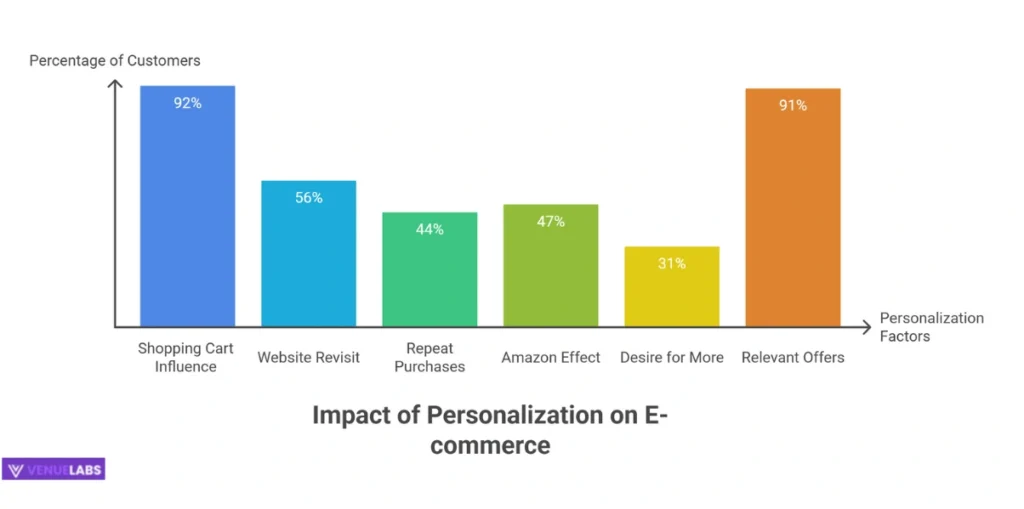
From recommendations to offers, e-commerce is where personalization truly shines.
- Shopping Cart Influence: 92% of customers are influenced to purchase due to customized recommendations in the shopping cart. 56% may revisit a website with personalized product recommendations.
- Repeat Purchases: 44% of customers with good personalized experiences are more likely to buy from brands again.
- Amazon Effect: 47% of customers tend to switch to Amazon if they don’t get personalized recommendations and experiences from the brand they are searching for.
- Desire for More: 31% of customers wish for a more personalized experience with eCommerce websites.
- Relevant Offers: 91% of consumers choose to shop from brands that offer relevant offers.
The Future of Personalization: An Even More Tailored World
The journey towards a fully personalized world is far from over.
- Increased Investment: More than 66% of American companies plan to invest more in personalization.
- First-Party Data Preference: 61% of companies prefer first-party data for their personalization strategy, shifting away from reliance on third-party cookies due to privacy concerns.
- Data Needs: 58.1% of marketers will need more information regarding consumers if they decide to personalize experiences effectively.
- Willingness to Share: More than 83% of customers will be ready to share their data in exchange for a personalized experience, underscoring the value exchange.
Challenges in Personalization: The Roadblocks
Despite the clear benefits, personalization isn’t without its hurdles.
- Irrelevant Recommendations: 58% of consumers see product recommendations they don’t want, highlighting the need for more accurate AI and data interpretation.
- Unshared Information: 28% of customers dislike it when brands use information they haven’t explicitly shared, emphasizing the importance of transparency and consent.
- Data Scarcity: Salesforce’s data reveals that 39% of marketers believe a lack of data stands in the way of adopting personalization, pointing to the need for robust data collection and management strategies.
- Privacy Regulations: 50% of companies say recent privacy regulations have made personalization more difficult, requiring businesses to navigate a complex landscape of data governance.
- Data Inconsistencies: 57% of senior marketing executives struggle with data inconsistencies when personalizing customer experiences, highlighting the challenge of unifying data from various sources.
- Omnichannel Obstacles: Only 24% of firms effectively invest in omnichannel personalization, with departmental silos and outdated technology being the main obstacles, preventing a seamless customer journey across all channels.
The Power of AI in Personalization: The Smart Future
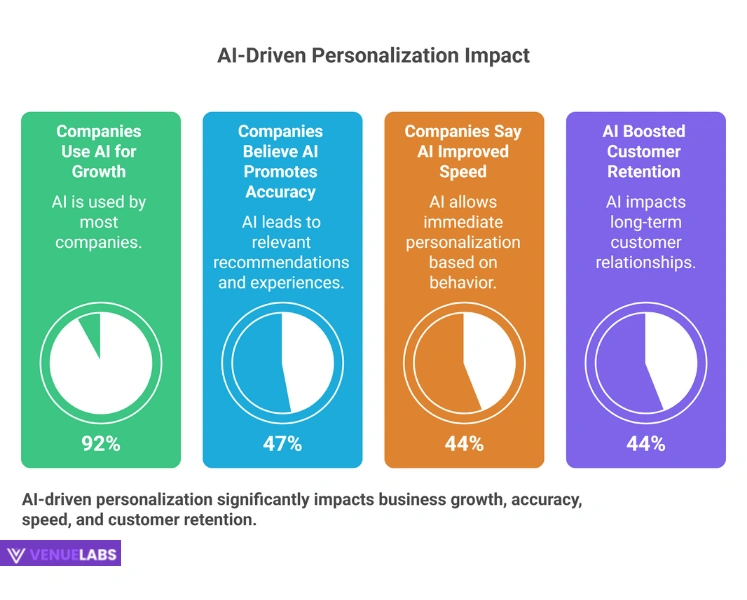
AI is not just a tool; it’s the brain behind the next generation of personalization.
- Growth Driver: 92% of companies use AI-driven personalization to drive growth. Nearly 60% of business leaders consider AI adoption an effective strategy for acquiring new consumers.
- Accuracy: 47% of companies believe that AI-driven personalization promotes accuracy, leading to more relevant recommendations and experiences.
- Real-time Speed: 44% of companies say AI improved real-time speed, allowing for immediate personalization based on current behavior.
- Customer Retention: 44% also noted that AI boosted customer retention and repeat purchases, showing its impact on long-term relationships.
Beyond the Numbers: What Users are Asking
While statistics paint a clear picture of personalization’s impact, conversations on platforms like Reddit and Quora reveal a deeper layer of user experiences and expectations. For example, common questions on Quora often revolve around the how-to of personalization:
- “What are the best tools for personalizing e-commerce websites?”
- “How can small businesses implement effective personalization without a huge budget?”
- “What data points are most crucial for truly effective personalized recommendations?”
- “Is it possible to personalize content for B2B clients on a deep, individual level?”
Meanwhile, Reddit users frequently share their personal experiences and concerns:
- “Why do streaming services keep recommending shows I’ve already watched/disliked?” (Highlighting imperfect algorithms)
- “How do brands know what I’m talking about in real life? Is my phone listening?” (Expressing “creepy” factor and privacy concerns)
- “I love when a brand gives me a discount on something I actually want. How do they do that?” (Positive reinforcement for good personalization)
- “Are there ways to opt-out of certain types of personalized ads without blocking everything?” (Desire for granular control)
These insights highlight that while personalization is desired, its execution needs to be precise, respectful of privacy, and genuinely helpful to avoid frustrating customers.
FAQs About Personalization Statistics
1. What is personalization in the context of business and marketing?
Personalization refers to the strategy businesses use to tailor experiences, content, and product offerings to individual customers based on their preferences, behaviors, and data, aiming to make interactions more relevant and engaging.
2. Why are so many businesses investing in personalization in 2025?
Businesses are heavily investing in personalization because it directly leads to increased customer satisfaction, higher conversion rates, improved brand loyalty, and significant boosts in revenue and ROI, making it a critical driver for success in a competitive market.
3. How does AI specifically enhance personalization efforts?
AI enhances personalization by enabling businesses to analyze vast amounts of customer data quickly and accurately, automate the delivery of tailored content and recommendations in real-time, predict customer needs, and scale personalized interactions across numerous touchpoints efficiently.
4. What are some of the biggest challenges businesses face when trying to personalize experiences?
Some of the biggest challenges include a lack of sufficient or consistent customer data, difficulties in unifying data from various systems, privacy concerns and regulations surrounding data usage, and the technical complexity of implementing and maintaining effective personalization tools across all channels.
5. How does personalization impact customer loyalty and purchase decisions?
Personalization significantly impacts customer loyalty by making customers feel understood and valued, leading to increased satisfaction and a greater likelihood of repeat purchases. Customers are also much more likely to choose and recommend brands that provide personalized experiences, strengthening their loyalty and influencing their purchasing decisions.
Also Read:
- Voice Search Statistics
- Facebook Statistics
- Android Statistics
- Snapchat Statistics
- Google Chrome Statistics
The Bottom Line: Embrace Personalization or Be Left Behind
The evidence is clear: personalization is no longer optional. It’s an absolute necessity for businesses that want to thrive in 2025 and beyond. From boosting revenue and ROI to building stronger customer loyalty and satisfaction, the benefits are undeniable.
As AI continues to evolve, your experiences as a customer will become even more seamless, intuitive, and, most importantly, uniquely yours.
So, get ready for a world where brands genuinely understand and cater to your individual needs – a world shaped by the powerful force of personalization.
